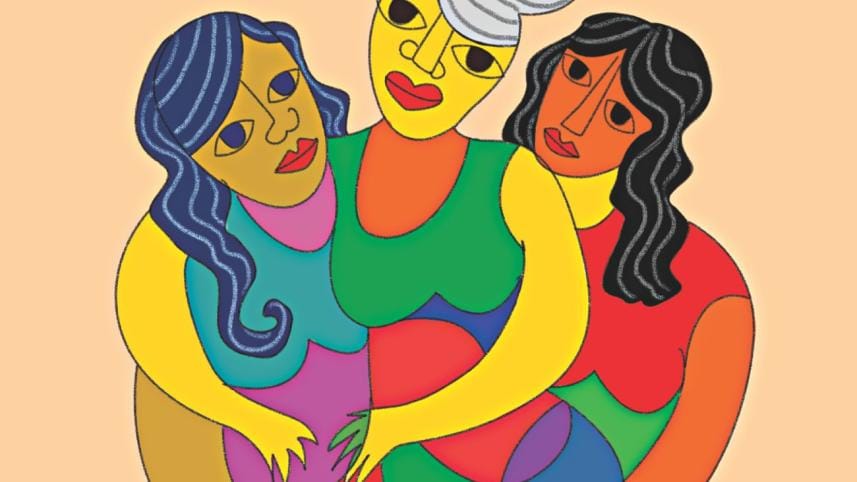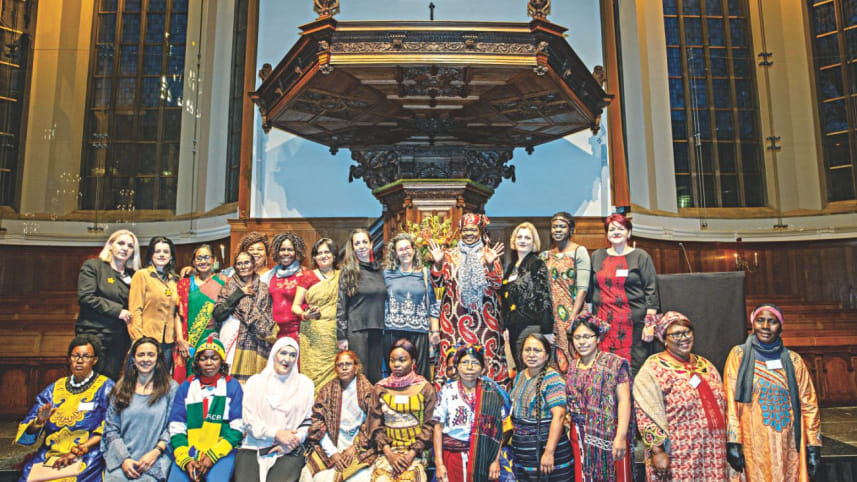The Sisterhood of Survivors

Jabeda Khatun (77 years) and Anoara Begum (68 years), two Birangonas of the Liberation War of Bangladesh arrived in The Netherlands on a gloomy winter day to join the second Global Survivor Network organised by Nobel Laureate Dr Denis Mukwege's foundation in November last year. The Network is a safe space where survivors meet other survivors around the world with one mission: to end the use of rape as a weapon of war. It has also announced an international call-out for a global reparations scheme at a high-level symposium.
It took a few frantic minutes of running around before we could spot them at the airport. There they were standing next to a Victoria's Secret shop with searching eyes, tightly clutching their bags. This trip involved many 'first times' for the Birangonas of Bangladesh—the first time ever attending a global network, the first time meeting other survivors from different countries, the first time speaking out before royals and international leaders.
Their journey started with an unnerving idea of taking them far from home.
We had tried before to attend the first Network with no success. I have been working with the Foundation since April 2017 to bring survivors from Bangladesh with our company Komola Collective in partnership with ('women's champions') Naripokkho supported by Manusher Jonno Foundation in Bangladesh. It was looking very unlikely this time too. However, with much hard work and a little bit of luck, they got visas just 10 minutes before the embassy was supposed to close for the day, and that was our last chance. So, when we finally saw them, it was a dream come true. Jabeda proudly declared, 'Not even my father could visit a country like this.'
As we were going to the hotel, Jabeda suddenly stopped at the door. She said, 'What if someone breaks in and tortures us?' We looked at one another, stunned. It was a startling reminder of how the human body and mind carries trauma for decades and how, without any warning, it can come forth. I have met some 80 survivors across Bangladesh since 2010 and found that survivors tend to seek one another out to cope with their shared pain. Music has also helped them to heal but their relentless struggle never ends. Once, during an interview, a survivor suddenly pointed towards a distant hayfield and said, 'Look they are coming. You can't see them but I can'. Another survivor would see her abusers in random places. She had to leave Bangladesh because of this horror. Bangladesh's Birangonas have never received any counselling to cope with PTSD. They have been living their lives with an unbearable burden.
The next morning, at the breakfast table, we met other survivors and organisers from 14 countries. We were in a festive mood, charged with emotion and fire for the hope to bring change. Our Birangonas could not imagine that women in so many other countries had also suffered rape and torture. They did, and the protracted effect of it still burns. With the slightest trigger, it reveals itself. A Bosnian survivor said something we all felt: "It's heartbreaking to see young women here." In the Network, they have been one another's triggers, resolution, and redemption.
"You are not alone. We are together in spirit and heart," a Ugandan survivor comforted others.
We met Dr Denis Mukwege on the second day. The first thing I noticed about him was: he has kind eyes. We talked, laughed, hugged a lot. It was heart-warming. Later he exclaimed, 'Bangladesh is here!'

At the Network, a Make Music Matter session used to be held almost every day. The survivors had boundless fun recreating and singing the theme song for it. We were bubbling with excitement because this song would be performed at the symposium. The idea was that Anoara would start the song with an acapella in Bangla and then everyone would join in. One day, as she finished singing her lines, she burst into dance with a Bengali folk song. Everyone was awestruck to see her sudden jubilation for a split second and then as if the dam of a river had been lifted, the flood of laughter drowned us all.
I have thought about Anoara's seemingly uncharacteristic behaviour and realised, this is all her—an open-hearted human being who has never given up living her life. That moment was the highlight of the retreat for me—discovering one's true self in absence of social stigma and collective shame.
Finally, the day of the symposium came. It was decided that after the panel discussions, Jabeda would ask the only question from the survivors' side. We were discussing the question she was going to ask. At one point she looked at me and said, 'It's okay, we don't need to discuss it anymore.' And I saw that fire again.
When it was her time to speak up, she stood up and briskly took the microphone, looking straight up at the members of the panel. In the presence of Her Royal Highness the Grand Duchess of Luxembourg, Nobel Laureate Dr Denis Mukwege, Special Representative of the UN Secretary-General on preventing sexual violence in conflict, other distinguished guests, and fellow survivors, she said in a clear voice: "I am Jabeda Khatun, I am from Bangladesh. Thank you for this opportunity. We have been recognised in Bangladesh. We now want reparations. We also want the world to recognise us. What will you do about it?"
Later, I asked the UN representative why none of her reports 'on conflict-related sexual violence' ever included Bangladesh; why the UN has failed to acknowledge and recognise the genocide and the mass rapes that took place during the Liberation War, perpetrated by the Pakistan Army. Her responses were as evasive and noncommittal as in the symposium.
The evening before we headed home, our film Rising Silence, that sheds light on the lives of Birangonas, had its first private viewing for the survivors. It was intense and extremely nerve-wracking. I was hiding in a bathroom when it was being screened. When I entered the room, the film had ended. They were holding hands, hugging one another tightly in little groups. There were the sounds of whispers and tears. They said the film 'is like a mirror'.
In the Network, we discovered a profound sisterhood, and we are in this movement together. We are grateful to the Mukwege Foundation for igniting the movement and for giving it global attention. Bangladesh's survivors joined voices with fellow survivors to tell a truth and the purpose of the truth is justice. Will justice be served for them?
Leesa Gazi is a founding member of Komola Collective, a London-based arts company dedicated to telling stories from women's perspectives. Leesa was the concept-developer, co-writer, and performer of 'Birangona: Women of War' theatre production, nominated for The Offies 2014. Leesa has completed her debut documentary feature Rising Silence that sheds light on the lives of Birangona women who suffered sexual violence in the war. The film has won the Best Documentary Film award at the Dhaka International Film Festival in January 2019.



 For all latest news, follow The Daily Star's Google News channel.
For all latest news, follow The Daily Star's Google News channel.
Comments